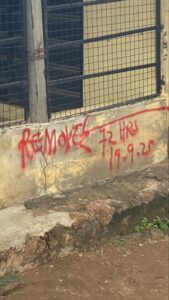
The Federal High Court in Abuja has ordered the service of court documents on Patrick Utomi, a former presidential candidate of the African Democratic Congress, in a suit filed against him by the Department of State Services over his alleged plans to establish a shadow government in Nigeria.
The presiding judge, Justice James Omotosho, granted an ex parte motion brought by the DSS’s lead counsel, Akinlolu Kehinde (SAN).
Kehinde had sought permission to serve the court papers on Utomi at his Lagos address via courier.
The DSS, in a suit marked FHC/ABJ/CS/937/2025 and dated May 13, approached the court for an order declaring the planned “shadow government” or “shadow cabinet” by Utomi and his associates as unconstitutional, arguing that it amounts to creating a parallel authority not recognised by the Nigerian Constitution.
The DSS also requested a perpetual injunction restraining Utomi, his agents, and associates from taking further steps towards establishing or operating a shadow government or similar entity.
The DSS in the suit argued that section 1(1) of the Nigerian Constitution declares its supremacy and binding force on all persons and authorities.
Section 1(2) prohibits the governance of Nigeria or any part of it outside the provisions of the Constitution.
Section 14(2)(a) states that sovereignty belongs to the people of Nigeria, from whom the government derives its authority through the Constitution.
The plaintiff (DSS) alleged that the proposed shadow government undermines constitutional democracy, poses a threat to national security, and could incite political unrest and intergroup tensions.
The DSS, in a supporting affidavit, stated that it is the principal domestic intelligence and security agency of Nigeria, mandated to detect and prevent threats to national security.
It claimed that Utomi and his associates had announced the formation of a shadow government through public statements, social media, and other platforms, with positions such as Ombudsman and members of a Policy Delivery Unit.
The DSS argued that such activities could mislead the public, weaken confidence in the elected government, and fuel public disaffection. It expressed concern that if unchecked, the structure could embolden separatist entities or other unlawful actors to replicate similar parallel arrangements.
At the hearing of the ex parte motion, Kehinde provided Utomi’s Lagos address and prayed the Court to grant its request.
Justice Omotosho granted the request for the documents to be served via courier and adjourned the case to June 25 for hearing.







